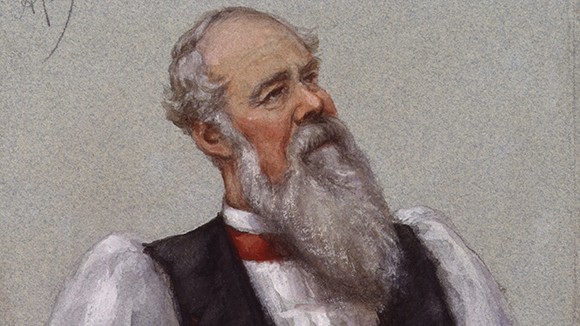Book Review—J. C. Ryle: Prepared to Stand Alone, by Iain Murray
May 16, 2018

May 16, 2018
Iain Murray, J.C. Ryle: Prepared to Stand Alone. Banner of Truth, 2016. 275 pps, $28.00.
One of the greatest Christian leaders to come out of England in the nineteenth century was John Charles Ryle. Famously known as “the man of granite with the heart of a child,” Ryle stands out as a towering example of Christian fortitude and pastoral excellence. Although he died more than a century ago, he still has much to say to our generation. And perhaps no one is better suited to teach us about Ryle than renowned biographer Iain Murray.
In Prepared to Stand Alone, Murray tirelessly pursues this task.
Of all things, Ryle was first and foremost an evangelical. In his own ministry, he focused on high doctrinal content mixed with evangelistic zeal. Murray notes, “The gospel itself was ever the most important part of whatever he spoke or wrote, and the gospel meant the person and work of the Lord Jesus Christ.” Richly rooted and built up in Puritan theology, Ryle desired to present biblical content in a clear and accessible manner, especially the doctrines of grace.
Facing a tumultuous Protestant crisis in his own day, Ryle notes that his foremost goal was “to provide for preaching of the Gospel to souls now entirely neglected.” With liberalism sweeping across the European continent, Ryle stood strong against the waves of change, ever holding out the gospel as the sole saving grace. Even in our day, we need more ministers like Ryle.
Perhaps no pastor in church history has descended so low from such a towering high. Having been raised in a wealthy, aristocratic family, Ryle wanted for nothing. He resided in a glorious estate, attended the best schools, and hobnobbed with societal elites. However, a poor business decision by his father reduced the Ryle family to ruins nearly overnight. This was a crushing blow for John Charles, one that would haunt him for his entire life.
However, he entrusted himself to the Lord. Murray notes, “The truth was he was being taught by the Saviour who ‘openeth and no man shutteth; and shutteth, and no man openeth’ (Rev. 3:7), and who promises, ‘I will bring the blind by a way they knew not; I will lead them in paths that they have not known’ (Isa. 42:16). There is nothing unforeseen and unplanned in the lives of God’s people.”
Out of poverty, the Lord called Ryle into ministry and prospered him, but not without severe chastening. Ryle faithfully received the Lord’s discipline, spending nearly twenty years of his life helping his family pay off their debts. Murray notes a report made of Ryle by James Bardsley:
When Mr Ryle was Rector of Helmingham, he wore threadbare clothes, and denied himself many things, in order to pay off, so far as was possible, the small depositors at his father’s bank. He was not himself a partner in the bank, and was not legally liable for anything.
There always exists the challenge of seeking unity while contending earnestly for sound doctrine. While the two aren’t mutually exclusive, they must be sought with both diligence and faithfulness to God. Ryle valued unity between gospel-believing Christians, despite gaping denominational differences. However, he maintained that true unity could exist between those who affirmed the essential elements of evangelical belief. These elements included:
Ryle writes, “No doubt we love unity; but we must distinctly maintain that true unity can only be built on God’s truth.” If, however, we align ourselves with proponents of false doctrine, Ryle offers a warning: “We endorse the sentiments of persons who have no real love of Christ’s truth.”
At a time when the Church of England was falling into apostasy, Ryle was one of the last true evangelicals of his generation. In his day, opponents were complaining of too much “dogma” in the Church—a commonly used strawman of false Christianity. But Ryle blasted “Christianity without bone, or muscle, or power.” In his words: “We have hundreds of ‘jelly-fish’ clergymen, who seem not to have a single bone in their body of divinity. . . . We have thousands of ‘jelly-fish’ sermons preached every year, sermons without an edge, or a point, or a corner, smooth as billiard balls, awakening no sinner and edifying no saint.” Without wavering, Ryle cared little for the attacks and insults of men who denied the gospel of Christ.
Further, the Church of England—founded against Roman Catholicism and in favor of Protestantism—began chasing Rome by reintroducing elements of the Mass and the confessional while simultaneously de-valuing Scripture through higher criticism. Ryle would concede to none of it. He confessed:
If anyone tries to persuade me that I ought to smile and look on complacently, with folded arms, while beneficed or licensed clergymen teach Deism, Socinianism, or Romanism, I must tell him plainly that I cannot and will not do it. He may tell me that I am a “troubler of Israel,” and a bitter controversialist; but I repeat that, when truth is in danger, I cannot and will not sit still.
We live in a time when it’s not popular to be a Christian. And the temptation for us will always be to weaken gospel essentials and to waiver on doctrinal convictions. To resist this, we need the steadfast blood of Ryle coursing through our veins. And yet, even as we study his life and ministry, we quickly see that it was in fact the grace of God that filled his mind and coursed through his soul. We should be thankful.